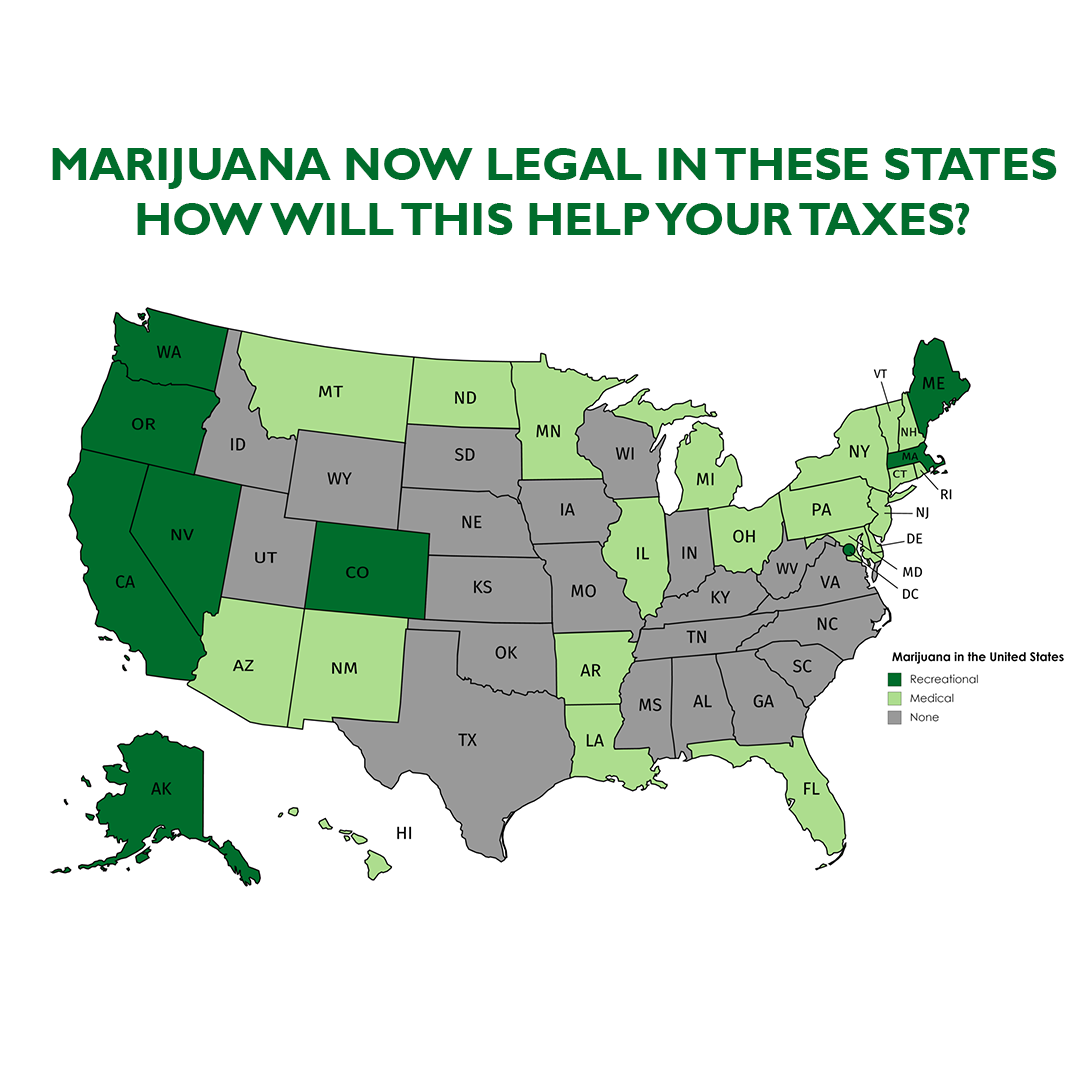Marijuana is legal in these states 2020 – How will this help your taxes?
The legalization of cannabis in 2020 will be considered in several U.S. states in 2020. States considered likely to legalize it for recreational use include Arizona, Florida, New Jersey, New Mexico, and New York. Voters in Arizona, Montana, New Jersey and South Dakota cleared cannabis for adult use, bringing the total number of states that have approved it for that purpose to 15.
Question: How do marijuana taxes work?
Answer: Marijuana sales are legal and taxed in nine states. States currently levy three types of marijuana taxes: as a percentage of the price (either the retail or wholesale price), based on weight (i.e., per ounce), and based on the drug’s potency (i.e., THC level). Some states use a combination of these taxes.
DO STATE AND LOCAL GOVERNMENTS RAISE FROM MARIJUANA TAXES?
Although prohibited under federal law, marijuana sales are legal and taxed in nine states: Alaska, California, Colorado, Illinois, Massachusetts, Michigan, Nevada, Oregon, and Washington. Marijuana is legal in Maine and Vermont but neither state has established its tax system yet. The District of Columbia also legalized marijuana but Congress currently prevents the city from regulating and taxing sales.
California Marijuana Taxes: 15% state excise tax on retail sales. Cultivators pay $9.25 per ounce for flowers and $2.75 per ounce for leaves. Localities (cities) can levy an excise tax on retail sales.
California’s revenue pays for administrative costs associated with marijuana legalization, and then uses excess funds for programs related to drug use, including economic development, academic studies, and youth programs.

Colorado and Washington have collected marijuana taxes since 2014. In the calendar year 2018, Colorado collected $267 million and Washington collected $439 million in state marijuana taxes, or roughly 1 percent of state and local own-source revenue in each state. Four other states reported a full year’s worth of state marijuana tax revenue in 2018: Alaska ($15 million), California ($354 million), Nevada ($87 million), and Oregon ($94 million). All totals were less than 1 percent of state and local own-source general revenue. (Note: None of these totals include local tax revenue.)
Marijuana is legal in 11 new states at the beginning of 2020 and will increase to 15 states in 2021.
Marijuana is legal in 11 new states and some of these states levy a tax on the purchase. But these tax rates are often the same as or close to the state’s general sales tax rate and do not raise much revenue.
HOW DO MARIJUANA TAX RATES DIFFER?
There are three ways state and local governments tax marijuana.
Percentage-of-price. These taxes are similar to a retail sales tax where the consumer pays a tax on the purchase price and the retailer remits it to the state. A few states levy their percentage of price tax on the wholesale transaction, but it is assumed this cost is then passed on to the consumer in the final purchase price. Some states also let localities levy a percentage of price tax—typically with a maximum rate.
Weight-based. These taxes are similar to cigarette taxes, except instead of taxing per pack of cigarettes the tax is based on the weight of the marijuana product. States with this type of tax also typically set different rates for different marijuana products. For example, California levies a $9.65 per ounce tax on marijuana flowers, a $2.87 per ounce tax on marijuana leaves, and a $1.35 per ounce tax on fresh plant material. As with other wholesale taxes, it is assumed most of this cost is passed on to the consumer in the final purchase price.
Potency-based. These taxes are similar to alcohol taxes, except instead of taxing drinks with a higher percentage of alcohol at higher rates (i.e., liquor is taxed at a higher rate than beer), the tax is based on the THC level of the marijuana product. Illinois is currently the only state with a THC-based tax. It taxes products with a TCH content of 35 percent or less at 10 percent of retail price and those with more than 35 percent at 25 percent of retail price. All marijuana-infused products (e.g., edibles) are taxed at 20 percent of retail price.
Some states also levy their general sales tax on the purchase of marijuana in addition to the excise taxes.





